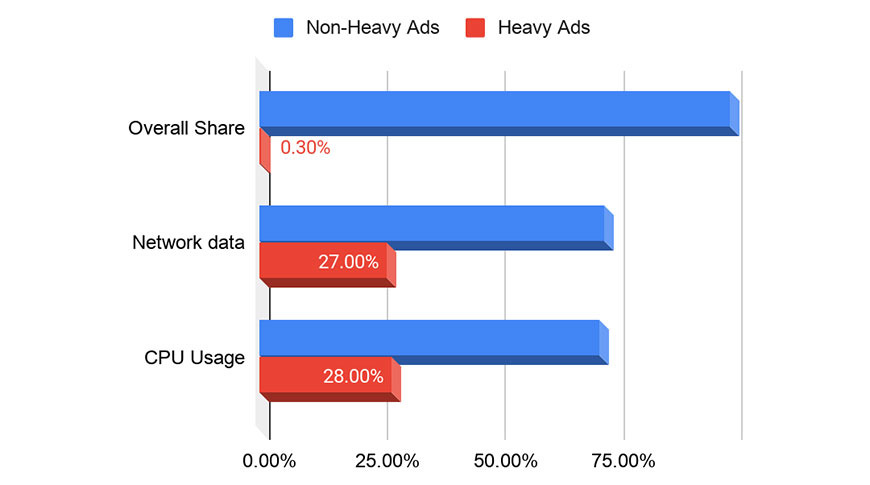Google plans to implement new limitations in its Chrome web browser after discovering certain ads overuse CPU and data resources, costing users device battery life and money.
Announced in a post to the Chromium blog on Thursday, Google's restrictions target ads that "consume a disproportionate share of device resources" without user knowledge.
Chrome Product Manager Marshall Vale says a future update to Chrome will limit the resources poorly coded ads like cryptocurrency miners have access to before user interaction. Initially, Chrome is setting restriction thresholds to 4MB of network data or 14 seconds of CPU usage in a 30-second period. Alternatively, ads will be limited after 60 seconds of total CPU usage.
An ad frame will be redirected to an error page if it reaches one of the above thresholds, with the page informing users that said ad used too many resources and was therefore removed from active display.
According to in-house measurements, only 0.3% of current ads exceed the stipulated thresholds. Still, those ads account for 27% of network data used and 28% of all ad CPU usage on Chrome. The figures underscore the need for intervention.
Ad creators can view Chrome's access reports to see which ads were unloaded due to the new restrictions and make necessary adjustments.
Google intends to test the proposed ad limitation system over the coming months and is targeting wide integration at the end of August. The extended timeline gives ad creators and tool providers time to prepare for the coming exodus.
 AppleInsider Staff
AppleInsider Staff








 William Gallagher
William Gallagher
 Andrew Orr
Andrew Orr
 Christine McKee
Christine McKee


 Mike Wuerthele
Mike Wuerthele
 Malcolm Owen
Malcolm Owen








10 Comments
uBlock works wonders.
This has been a well known problem for years. I'd be curious to know what finally made them act (or pretend to act). Presumably some network threatened to block their browser or something.
Who would have guessed that a web browser supplied by an advertising company was designed be advertising friendly?
I can guarentee that they will not fix this. They'll stop a single ad using up so much data/cpu, but they'll just fix that by using a higher rotation.
About 2 years ago my sister in law visited the US from Australia so I gave her an old iphone on Verizon to use for the duration. We restored her last backup, so it was just like her phone. Off she went.
After 1 day, I was getting exceeded data notices from Verizon. I assumed initial syncing of mail etc. was the cause, maybe some tethering. Whatever.
Anyway, every. single day. I. got. excess. data. charges.
So when she calls me up I offer to walk her through finding the data use by app, just to find out what's behind it.
It's chrome.
"But I just view a couple of pages a day, usually the NY Times" and some web based email that a client/customer requires her to use.
I suggested that she maybe uninstalls chrome and uses safari for the duration.
Oh, no! Not possible. Inseert "safarin never works, I must always use chrome" speech someone has previously fed her. No she wouldn't install uBlock or any other ad-blocker (some of her clients are in the advertising industry, and she considers adverts to be her meal ticket). So I ended up negotiating a larger data deal with Verizon that month... The things we do for family right?
Who would have guessed that a web browser supplied by an advertising company was happy to continue to run adverts continuously even when you are not looking at them. The fact that they get paid for each ad rotation has absolutely nothing to do with it.
I can guarentee that google will not fix this. They'll stop a single ad using up so much data/cpu, but they'll just fix that by using a higher rotation.